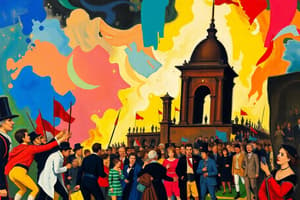Podcast
Questions and Answers
Тарихтың негізгі тақырыптарының бірі неден тұрады?
Тарихтың негізгі тақырыптарының бірі неден тұрады?
- Экологикалық тарих
- Экономикалық тарих (correct)
- Технологиялық тарих
- Философиялық тарих
Бастапқы дереккөздерді талдаудың қандай маңызды аспектісі бар?
Бастапқы дереккөздерді талдаудың қандай маңызды аспектісі бар?
- Тарихи интерпретация
- Салыстырмалы зерттеу
- Әлеуметтік талдау
- Критикалық бағалау (correct)
Тарихи зерттеулерде контекстуализация не үшін қажет?
Тарихи зерттеулерде контекстуализация не үшін қажет?
- Әлеуметтік құрылымдарды зерттеу
- Тарихи оқиғаларды өз ортасында түсіндіру (correct)
- Дереккөздердің шынайылығын тексеру
- Философияларды салыстыру
Тарихи кезеңдердің бөлінуін қалай анықтаймыз?
Тарихи кезеңдердің бөлінуін қалай анықтаймыз?
Тарихты зерттеудің маңызды аспектісі қандай?
Тарихты зерттеудің маңызды аспектісі қандай?
Қай тақырып қоғамдық тарихты зерттеуде басты назарда болады?
Қай тақырып қоғамдық тарихты зерттеуде басты назарда болады?
Тарихи деректерді зерттеуде қандай мәселе кездеседі?
Тарихи деректерді зерттеуде қандай мәселе кездеседі?
Келесі қай бағыт тарихтың жазылуын зерттейді?
Келесі қай бағыт тарихтың жазылуын зерттейді?
Тарихты зерттеу арқылы қандай дағды дамытылады?
Тарихты зерттеу арқылы қандай дағды дамытылады?
Келесі қай процесс тарихи оқиғаларды әртүрлі перспективадан қайта құрастыруды қамтиды?
Келесі қай процесс тарихи оқиғаларды әртүрлі перспективадан қайта құрастыруды қамтиды?
Әртүрлі мәдениеттер мен көзқарастарды зерттеу қандай сезімді қалыптастырады?
Әртүрлі мәдениеттер мен көзқарастарды зерттеу қандай сезімді қалыптастырады?
Тарихты глобалды көзқараспен қарастыру не үшін маңызды?
Тарихты глобалды көзқараспен қарастыру не үшін маңызды?
Тарихты оқудағы басты мақсаттардың бірі неде?
Тарихты оқудағы басты мақсаттардың бірі неде?
Flashcards
Тарихтың қазіргі заманмен байланысы
Тарихтың қазіргі заманмен байланысы
Тарихты зерттеуде, біздің қазіргі түсінігіміз өткеннің тұжырымдамасымен байланысты екенін мойындау.
Тарихи деректердің бұрмалануы
Тарихи деректердің бұрмалануы
Тарихи деректердің авторының ықпал ететін алғышарттармен және дәлелдердің шектеулерімен қалыптасатынын түсіну.
Тарихты зерттеудің маңызы
Тарихты зерттеудің маңызы
Тарихты зерттеу қазіргі уақытты түсінуге, сын тұрғысынан ойлау дағдыларын дамытуға, өзге мәдениеттерге сенімділік пен ынтымақтастықты арттыруға мүмкіндік береді.
Тарихтың қателіктерінен сақтану
Тарихтың қателіктерінен сақтану
Signup and view all the flashcards
Тарихи деректердің жетіспеушілігі
Тарихи деректердің жетіспеушілігі
Signup and view all the flashcards
Тарих зерттеуі
Тарих зерттеуі
Signup and view all the flashcards
Саяси тарих
Саяси тарих
Signup and view all the flashcards
Әлеуметтік тарих
Әлеуметтік тарих
Signup and view all the flashcards
Экономикалық тарих
Экономикалық тарих
Signup and view all the flashcards
Бастапқы көзден ақпарат алу
Бастапқы көзден ақпарат алу
Signup and view all the flashcards
Тарихтың интерпретациясы
Тарихтың интерпретациясы
Signup and view all the flashcards
Кезеңдерге бөлу
Кезеңдерге бөлу
Signup and view all the flashcards
Салыстырмалы тарих
Салыстырмалы тарих
Signup and view all the flashcards
Study Notes
Historical Periods
- History encompasses the study of past events, human societies, and cultures.
- It's a vast and multifaceted field, analyzing various aspects of human existence, including political systems, social structures, economic activities, intellectual thought, and artistic expression.
- Historians examine primary sources, such as letters, diaries, and official records, to understand past events and interpret historical trends.
- Secondary sources, such as scholarly articles and books, provide context and analysis of historical data.
Key Themes in History
- Political history: Examines the evolution of political systems, including governments, laws, and conflicts.
- Social history: Focuses on the lives and experiences of ordinary people within a given society, considering social classes, gender roles, and cultural practices.
- Economic history: Explores the development of economic systems, examining trade, production, consumption, and financial institutions.
- Cultural history: Investigates the artistic expression, beliefs, and customs of a particular culture or time period.
- Intellectual history: Examines the development of ideas, philosophies, and scientific thought throughout history.
Historical Methods
- Primary source analysis: Critical evaluation of original documents, artifacts, and other evidence from the past.
- Historical interpretation: Reconstructing past events based on available evidence, considering various perspectives, and acknowledging limitations of the source material.
- Contextualization: Placing historical events within their specific environments, considering social, economic, and political factors.
- Historiography: The study of historical writing and interpretations, recognizing that historical narratives are shaped by different perspectives and biases.
- Critical thinking: Assessing the validity and reliability of historical sources and interpretations.
Historical Approaches
- Periodization: Dividing history into distinct periods, based on significant events or changes.
- Comparative history: Examining similarities and differences across different cultures and time periods.
- Global history: Emphasizing interconnectedness and interactions between different parts of the world throughout history.
- Postcolonial history: Examining the impacts of colonialism on colonized regions and cultures.
- Social constructivism: Recognizing that our understanding of the past is shaped by the present.
Challenges in Historical Study
- Bias and perspective: Recognizing that historical accounts are influenced by the biases of the authors and the limitations of available evidence.
- Incomplete records: Acknowledging that not all aspects of the past are fully documented or understood.
- Interpreting evidence: Addressing varied interpretations of evidence and understanding differing perspectives on historical events.
- Preserving historical sources: Maintaining accurate records and preserving artifacts for future generations.
Importance of Studying History
- Understanding the present: Recognizing that the present is shaped by the past and learning from historical experiences.
- Developing critical thinking skills: Analyzing evidence, evaluating arguments, and forming reasoned judgments.
- Promoting empathy and understanding: Learning about different cultures and perspectives to foster tolerance and cooperation.
- Appreciating human progress and achievements: Celebrating cultural and scientific advancements.
- Avoiding repeating past mistakes: Recognizing patterns of conflict and societal challenges to inform present-day decisions.
Studying That Suits You
Use AI to generate personalized quizzes and flashcards to suit your learning preferences.




